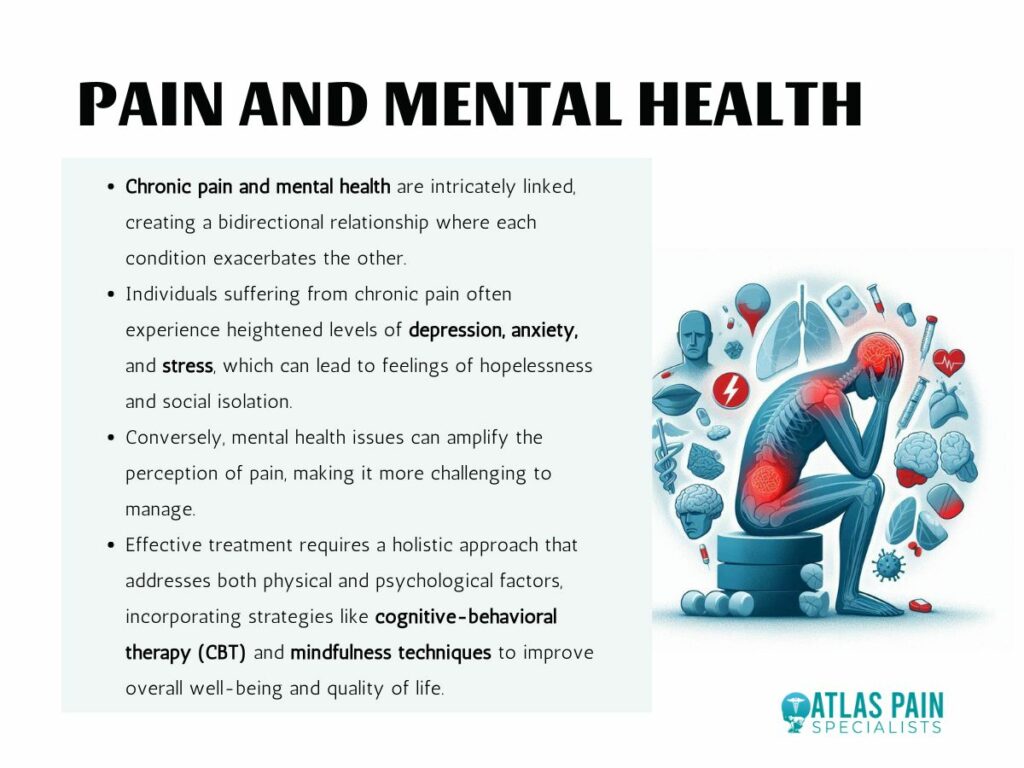

The Importance of Mental Health Support in Pain Management
Managing pain isn’t just about addressing physical discomfort—your mental health plays a huge role in how you experience and cope with it. When you're dealing with chronic pain, the emotional strain can be just as overwhelming as the pain itself. Stress, anxiety, and depression often intensify the pain, creating a cycle that's hard to break.
That’s why mental health support is a vital part of effective pain management. By prioritizing your emotional well-being, you can gain better control over your pain and improve your overall quality of life, making it easier to heal and feel like yourself again.
Understanding the Connection Between Pain and Mental Health
Pain is more than just a physical sensation. It can affect every aspect of your life, including your emotional well-being. In fact, pain and mental health are often closely connected, with each influencing the other in powerful ways. Understanding this connection is crucial to finding the right approach to managing both your physical and emotional health.

The Impact of Chronic Pain on Mental Health
Living with chronic pain can take a toll on your mental health. Prolonged pain often leads to feelings of frustration, anxiety, and depression. This emotional distress can, in turn, make the physical pain feel worse. When you're constantly in pain, it can be difficult to stay positive, leading to a cycle where your mood and pain levels feed off each other.
How Mental Health Affects Your Perception of Pain
Your mental state doesn’t just affect how you cope with pain—it can also influence how you physically feel it. Stress, anxiety, and depression can heighten your sensitivity to pain, making even mild discomfort feel unbearable. The brain processes pain signals differently when you are under emotional distress, often amplifying the sensation.
The Role of Mental Health Support in Pain Management
Given the strong connection between pain and mental health, it’s no surprise that mental health support plays a crucial role in pain management. Addressing both the physical and emotional aspects of pain is key to achieving long-term relief.
Cognitive Behavioral Therapy (CBT) for Pain Management
One of the most effective mental health treatments for pain management is cognitive behavioral therapy (CBT). CBT helps you change negative thought patterns that contribute to pain and teaches you coping strategies to manage discomfort. By changing how you think about your pain, you can reduce its emotional impact and improve your ability to cope with it.
CBT for chronic pain focuses on breaking the cycle of pain and emotional distress by addressing both the mental and physical aspects. Rather than targeting pain directly, it helps reduce the brain’s sensitivity to pain signals over time by reshaping the emotional responses that can amplify discomfort. This makes it especially valuable for those whose pain persists despite medication or physical treatments, offering a pathway to better daily function and emotional balance.
The Importance of Emotional Support
Living with chronic pain can be isolating, and many people find it difficult to talk about their experiences. Having a strong support network of friends, family, or even a therapist can make a significant difference in how you cope with pain. Emotional support helps you stay positive and can provide a sense of comfort when you're feeling overwhelmed by pain.
Support groups, both in-person and online, can also be beneficial. Talking to others who understand what you're going through can reduce feelings of isolation and give you new insights into managing pain.
Integrating Mental Health into Pain Management Plans
Many healthcare providers now recognize the importance of integrating mental health support into pain management plans. Treating pain isn't just about addressing the physical symptoms—it’s also about ensuring that the emotional aspects of pain are managed. For this reason, pain management programs often include mental health counseling, stress management techniques, and relaxation exercises like meditation or yoga.
By addressing both your mental and physical health, you can create a more comprehensive pain management plan that leads to better outcomes. It's important to take a holistic approach where attention to both appearance and structure ensures long-term stability.
Barriers to Accessing Mental Health Support in Pain Management.
Mental health support plays a critical role in managing chronic pain, but accessing this support isn't always easy. There are several barriers that can prevent individuals from getting the mental health care they need. Understanding these challenges is the first step in finding ways to overcome them and improve overall pain management.
Stigma Surrounding Mental Health
One of the biggest barriers to accessing mental health support is the stigma that still surrounds mental health issues. Many people feel ashamed or embarrassed to seek help for emotional or psychological struggles, especially when it comes to pain management.
This stigma can prevent individuals from seeking the care they need, leaving them to suffer in silence. When chronic pain is involved, there’s often a perception that focusing on mental health might downplay the seriousness of the physical pain. However, the connection between mental health and physical pain is real, and ignoring it can make the pain even worse.
Limited Access to Resources
Another significant barrier is limited access to mental health resources. In many areas, especially rural or underserved communities, there are simply not enough mental health professionals to meet the demand. Even in more populated regions, long wait times and limited availability of mental health providers can make it difficult to get timely care.
The cost of mental health services can be prohibitive for many individuals. Without insurance coverage or affordable options, seeking counseling or therapy may feel out of reach. This lack of access is a major roadblock for those who need support as part of their pain management plan and can lead to more costly repairs down the road.
Lack of Awareness
Many people are simply unaware of the role mental health plays in pain management. They may not realize that addressing their emotional well-being can have a direct impact on their physical pain.
This lack of awareness can prevent individuals from seeking out the mental health support they need, leaving them to focus solely on physical treatments that may not fully address their pain. Increasing awareness about the connection between mental health and pain can help more people take proactive steps to get the support they need.
Recommendations for Improving Mental Health Support in Pain Management
Given the barriers to accessing mental health support, it's clear that improvements are needed to ensure that individuals managing chronic pain can receive the comprehensive care they deserve.
Raising Awareness About the Connection Between Pain and Mental Health
One of the most important steps in improving mental health support is raising awareness. Healthcare providers, including doctors and pain specialists, need to emphasize the link between mental health and chronic pain. Educating patients about how their mental state can influence their physical pain can encourage them to seek out mental health support as part of their treatment plan.
This education should start early in the pain management process. The sooner patients understand the importance of mental health in managing pain, the more likely they are to seek help when they need it.
Expanding Access to Mental Health Services
To address the issue of limited access, there need to be more mental health professionals available, particularly in underserved areas. Telehealth services can be an effective solution, providing patients with access to mental health support from the comfort of their own homes.
By offering online therapy and counseling options, patients who may not have access to local providers can still get the care they need. Insurance companies and healthcare providers should also work to make mental health services more affordable. Investing in mental health support can prevent more significant issues down the line.
Integrating Mental Health into Pain Management Plans
Mental health support should be fully integrated into pain management plans. Rather than treating mental health as a separate issue, it should be considered an essential part of managing chronic pain. This means that pain specialists should work closely with mental health professionals to provide coordinated care that addresses both the physical and emotional aspects of pain.
For example, if a patient is receiving treatment for back pain, their plan should include not only physical therapies but also mental health support, such as counseling or stress management techniques.
Reducing Stigma Around Mental Health
Reducing the stigma surrounding mental health is critical for encouraging individuals to seek help. Public awareness campaigns and education initiatives can play a significant role in breaking down the barriers of stigma and making mental health care more accessible and acceptable.
Healthcare providers can also help by normalizing conversations about mental health during routine check-ups and pain management appointments. When patients feel that it’s normal and encouraged to discuss their emotional well-being, they may be more likely to seek the help they need.
Providing Supportive Resources and Tools
Finally, providing patients with easy access to mental health resources and tools can improve their ability to manage both their pain and emotional health. Support groups, mobile apps, and online therapy platforms can all offer valuable support for individuals who may not have access to traditional services.
Managing chronic pain effectively requires access to mental health support tools. Patients should be informed about the resources available to them so they can take control of their own care.
Pain Management for Athletes: Balancing Performance and Injury Prevention
When it comes to athletes, balancing performance with injury prevention requires a strategic approach that often extends beyond just physical conditioning. Managing pain effectively is a key part of staying at the top of your game, and the right pain management plan can help you not only recover faster but also prevent further injury.
As we explore pain management strategies for athletes, you'll discover how a proactive approach can keep you performing at your best while minimizing the risk of long-term damage.
About Dr. Sean Ormond



